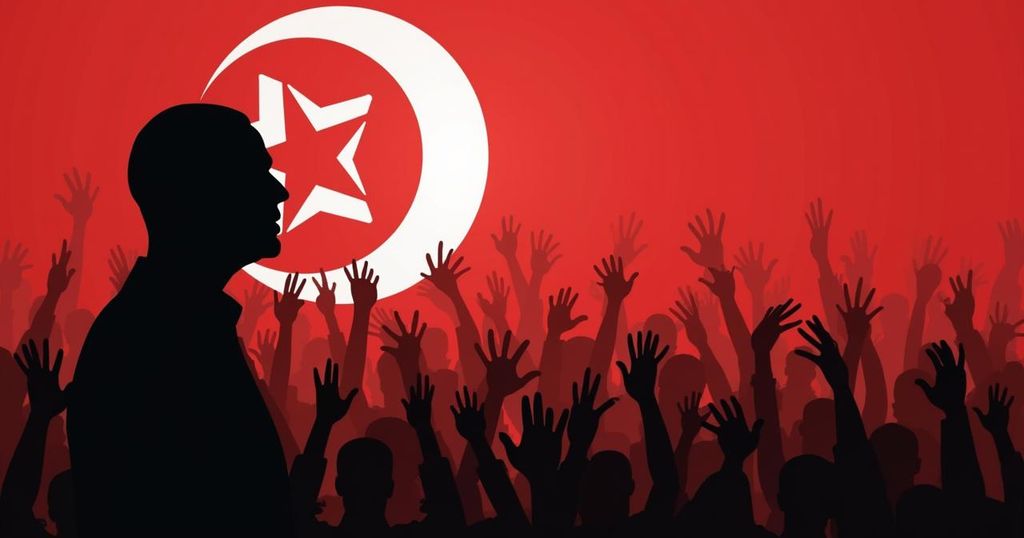Tunisia Presidential Election: Saied Set to Secure Second Term Amidst Controversy
Incumbent President Kais Saied is projected to win a second term in Tunisia’s presidential election, drawing criticism from the opposition over electoral integrity due to the disqualification of serious challengers. An exit poll indicated Saied would receive 89.2% of the vote amid a historically low turnout of less than 28%. The political context reveals rising authoritarianism and economic struggles in the country since Saied assumed power in 2019.
On Sunday evening, after the conclusion of Tunisia’s presidential election, incumbent President Kais Saied appeared poised to secure a second term in office. However, the opposition has raised significant concerns regarding the election’s credibility and integrity, alleging systematic exclusions of serious contenders from the race. As reported by an exit poll broadcast on state television, Mr. Saied, aged 66, was projected to receive 89.2% of the votes based on a turnout that fell below 28%, a historically low level for presidential elections in Tunisia since the 2011 revolution. Given these results, if confirmed in the coming days, it is anticipated that the election will not proceed to a runoff stage. Mr. Saied’s challengers included Zouhair Maghzaoui, a former lawmaker who initially supported the president’s consolidation of power in 2021 but later opted to run against him; he was expected to garner approximately 3.9% of the vote. The other contender, Ayachi Zammel, a businessman imprisoned since prior to the election, was anticipated to achieve around 6.9% of the votes according to exit poll projections. Zammel has witnessed a rise in his popularity even while incarcerated, despite serving a 14-year sentence for alleged election law violations. Notably, many prominent figures from larger opposition parties were either imprisoned or barred from running, as the electoral commission, which is believed to be under Saied’s influence, disqualified them. This included senior opposition figure Rached Ghannouchi of the Ennahdha party and Abir Moussi of the Free Destourian Party, both of whom face serious legal challenges. The political landscape in Tunisia, once hailed as a model of democracy following the Arab Spring, has dramatically shifted under President Saied. Since his election in 2019, he has eroded democratic institutions, including dissolving parliament and revising the constitution, leading to a regression towards autocracy. Human Rights Watch has reported the detention of over 170 individuals under politically charged circumstances. In parallel to these political developments, Tunisia faces substantial economic challenges marked by shortages of essential goods, high unemployment rates, and rampant inflation. Saied’s administration has struggled with addressing these crises while resisting necessary austerity measures that could facilitate negotiations with the International Monetary Fund (IMF) for financial assistance. Currently, Tunisia is partially reliant on a recovery in tourism and support from the European Union, contingent upon stringent measures against migration.
The context of this article is situated within the ongoing political climate in Tunisia, which has progressively shifted from a hopeful democracy post-Arab Spring to an increasingly authoritarian regime under President Kais Saied. Following his election in 2019, Saied has enacted a series of constitutional revisions and has eliminated political opposition through legal and extralegal means. The political suppression has not only attracted national attention but also international scrutiny, with human rights organizations documenting widespread detentions and the curtailment of civil liberties. Simultaneously, Tunisia’s economic situation has deteriorated, complicating the political landscape and feeding public discontent.
In conclusion, the recent presidential election in Tunisia reflects a troubling trend towards autocratic governance under President Kais Saied, overshadowed by allegations of electoral misconduct and suppression of dissent. While the projected results suggest an overwhelming victory for Saied, the low voter turnout highlights a significant discontent among the populace. The dual crises of economic hardship and political repression mark a critical juncture for Tunisia, as the nation grapples with its democratic aspirations amidst a backdrop of increasing authoritarianism.
Original Source: www.dw.com




Post Comment